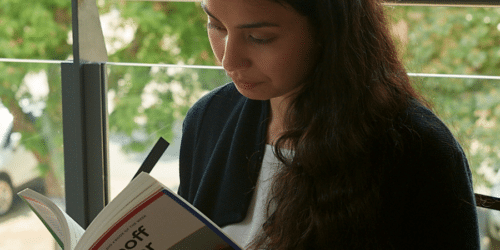
One of the challenges of being a poet is to grab and maintain your reader’s attention. Attention is a rare commodity these days when information comes flying in constantly through the blue light of our screens. How do you seize the whole of a person’s focus, if only for the few minutes it takes to read a poem? How would you entice them to come back into your world and sit still with your poem for a second, or perhaps multiple times? One of the ways is to appeal to the imagination is by shaking things up a bit – you make the reader see something in a way they have never seen it before.
In the early twentieth century, Russian Formalist Vicktor Shklovsky first coined the phrase ‘defamiliarization’ which became central to many artistic movements including Surrealism. Shklovsky said that the device of art (meaning all forms of art, including poetry) is “estrangement” of things . . . enhancing the difficulty and duration of perception, so that the perceptual process is an end in itself and should be prolonged. Put more simply – art needs to slow down perception by making things a bit more difficult – or interesting – for the audience. The audience then becomes part of the process of creating meaning, and they will see things with fresh eyes.
So how do you make the commonplace strange enough for people not just to look at something, but for it to really open their eyes? There are many ways into this kind of thinking, but let us focus on looking at ordinary, everyday things. To use my own practice as an example, the poem below comes from my chapbook Maps of the Abandoned City (SurVision 2019). It was chosen to be one of the Poems on the Underground, so many people would have spent a little time with it on their travels. The chapbook imagines people have built up a city, and then left it:
The Square of the Clockmaker
When the last train left,
the tunnel rolled the train track
back into its mouth and slept.
Clocks unhitched themselves
from the made-up world of timetables
and opened wide their arms.
And in the square of the clockmaker
a century of clocks
turned their faces to the sun.
For this poem, I was working with several puns and pushed them as far as I could. The idea that a tunnel has a mouth is one of those hidden metaphors in language. That clocks have hands (another hidden metaphor governed by anthropomorphism!) the might also be assumed to have arms. This seems logical to me. I thought too of sundials and the way, before timetables, we used the sun to measure our days. And sunflowers do turn their heads towards the sun, so I had the idea of clocks being transmuted into sunflowers. It’s important for me to present the reader with things they recognise, and then make them strange. As a writer, I enjoy the play of this. Serious play is a good definition of poetry, for me.
The Square of the Clockmaker is a kind of rebelling about the world, as it is now, by the clocks themselves. I have basically anthropomorphised all of these everyday things to say something about the way I feel. In so doing I hope to connect with readers who might have the same longing for a simpler way of life; a time when there was time enough.
 Helen Ivory is a poet and visual artist. She edits the webzine Ink Sweat and Tears, and teaches for NCW Academy online. She has published five collections with Bloodaxe Books: The Double Life of Clocks (2002), The Dog in the Sky (2006), The Breakfast Machine (2010), Waiting for Bluebeard (2013) and The Anatomical Venus (2019), with a sixth, Constructing a Witch, out in 2024. Fool’s World, a collaborative Tarot with artist Tom de Freston (Gatehouse Press), won the 2016 Saboteur Best Collaborative Work award. A book of collage/mixed media poems, Hear What the Moon Told Me, was published KFS in 2017, a chapbook, Maps of the Abandoned City, by SurVision in 2019, and Wunderkammer: New and Selected Poems was published by MadHat in the US in 2023. The Anatomical Venus was shortlisted for the poetry category of the East Anglian Book Awards 2019.
Helen Ivory is a poet and visual artist. She edits the webzine Ink Sweat and Tears, and teaches for NCW Academy online. She has published five collections with Bloodaxe Books: The Double Life of Clocks (2002), The Dog in the Sky (2006), The Breakfast Machine (2010), Waiting for Bluebeard (2013) and The Anatomical Venus (2019), with a sixth, Constructing a Witch, out in 2024. Fool’s World, a collaborative Tarot with artist Tom de Freston (Gatehouse Press), won the 2016 Saboteur Best Collaborative Work award. A book of collage/mixed media poems, Hear What the Moon Told Me, was published KFS in 2017, a chapbook, Maps of the Abandoned City, by SurVision in 2019, and Wunderkammer: New and Selected Poems was published by MadHat in the US in 2023. The Anatomical Venus was shortlisted for the poetry category of the East Anglian Book Awards 2019.
Helen is also an NCW Academy online course tutor, and will be leading our upcoming intermediate poetry course. Find out more →
You may also like...
How to read like a poet
In this article, poet and NCW Academy tutor Kathryn Simmonds shares how reading has influenced her poetry, and encouraged her to play with form, subject and tone.

8th December 2023
Five creative writing tips for any writer
Forward Prize-winning writer Anthony Capildeo shares their best advice for aspiring writers

19th February 2021
How to get your poetry published
Flo Reynolds shares tips on what to do and NOT do

2nd September 2020






